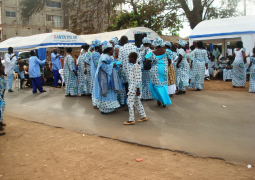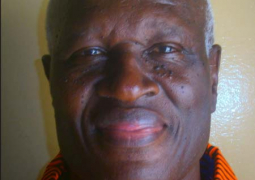
Solidarity
Statement From 16 to 18 March 2017
Introduction
We bring you heartfelt congratulations and solidarity greetings from the West African Journalists Association (WAJA) and the Federation of African Journalists (FAJ) as you rejoice over your release from virtual captivity under the regime of President Yahya Jammeh.
Over the last 22 years, the Gambian people witnessed massive human rights violation, including press freedom and the repression of journalists. Media houses were attacked, journalists arrested, jailed, tortured, kidnaped, killed, or forced into exile. About 100 Gambian journalists fled the country for their lives. Tribute to our colleagues who perished in the course of the tyranny, and to the courage of those who remain fearless to the very end. The people of the Gambia are indebted to you for telling their stories, howbeit to the peril of your lives.
May we all observe a moment of silence to the sainted memories of those tortured to death…. Amen!
The Litany of attacks of the media
The repression of Gambian journalists is well documented. Even as the process leading to the historic 1st December 2016 votes unfolded, journalists remained the subject of attack.
On Thursday, 10 November, freelance journalist and documentary producer, Alhagie Manka and journalist Yunus Salieu of the Daily Observer, were both arrested and detained overnight at the National Intelligence Agency (NIA) headquarters in Banjul.
Yunus and Manka were arrested by soldiers for merely photographing sympathizers of the ruling APRC Party who were celebrating at President Jammeh’s nomination. They were released at separate intervals without charge.
The Director General of the Gambia Radio and Television Services (GRTS), Mr. Momodou Sabally was relieved of his duties on 8 November and detained at the NIA. While journalist Bakary Fatty of the same state-owned GRTS, was also picked up and detained by the NIA. No reason was given or provided for their arrest and detention.
The freelance journalist and cameraman Ebou Waggeh, working for Reuters, was arrested on Thursday, 19 January 2017 and detained at the Kairaba Police Station.
These arbitrary detentions were commonplace during the regime of President Jammeh, but we named these few to draw the attention of the new government to the ugly tactics of its predecessor in the harassment of the media and journalists. Journalism is simply not a crime. As we celebrate this newfound democracy, we hope the media will truly be allowed to do their jobs freely.
Amidst the euphoria of a new beginning, we were particularly stunned by a recent development in which, journalist Kebba Jafang of the FOROYAA Newspaper was reportedly assaulted by members of the victorious coalition that defeated the dictator. That this happened at all during good times, underlines why journalists should always be watchful even in familiar terrains. We are told the Minister of Interior apologized, which is good, but what is needed now is action to end impunity for crimes against journalists – not apology.
A Promise of Renewal
There is certainly an air of renewal sweeping across The Gambia. WAJA and FAJ are particularly delighted, by the promise of the new administration to respect and promote press freedom and freedom of expression. This will undoubtedly impact positively on our members and the practice of journalism in The Gambia.
The Government of President Adama Barrow ordered on Monday 23 January 2017, the release of all political prisoners, including journalists.
The new Justice Minister, Mr. Abubacarr Tambadou on 7 February 2017 said that The Gambia’s press is set to win unprecedented freedom when the new government overhauls the constitution and laws of the Gambia under former leader Yahya Jammeh.
While being sworn in, Mr Tambadou, a former UN Assistant Prosecutor, said that he hopes to remove restrictive laws on the media. “We will be starting a constitutional review process with a view to ensuring that our constitution is relevant and serves the purpose for which Gambians adopted it.”
This is welcoming because under the leadership of President Jammeh, journalists were slapped regularly with crimes including: sedition, criminal defamation and publication of false news, offences described as “catch-all” by Amnesty International, for which many served jail terms.
Strengthening the Media Space
This Solidarity Mission to The Gambia is our way of backing our affiliate, The Gambia Press Union (GPU). With this mission, we declare our unqualified commitment in working with the GPU get fully engaged with the reforms to be undertaken by the new government especially in the media sector. This is why we feel even more excited and honoured for the opportunity to have met with relevant officials of the Gambian Government including the Minister of Information and the Director General of the Gambian Radio and Television Services (GRTS) to discuss some of the issues facing the media and journalists in the country as listed below:
1- Media Law reforms
We acknowledge the initial pronouncement of the new government to embark upon an in-depth legal reform including Media Law. Such media reforms should encompass among others:
Decriminalisation
of libel;
Access to information;
Inclusive Public Service Broadcasting;
Democratic Media regulation;
Upholding Press Freedom and the Safety of Journalists in the new constitution;
Media training, Etc...
2- Implementing Court Decisions
In the true nature of the former government of Mr. Jammeh, many decisions by National and the ECOWAS Courts on violations of press freedom in the Gambia, were ignored and disrespected by the administration. We call on the present Government to revisit those court rulings for the sake of justice and the rule of law.
3- Investigating the Past
The investigations on journalists killed and those who disappeared are still pending, especially the cases of Deyda Hydara and Chief Manneh. It is easy to say let’s leave the past in the name of reconciliation, but reconciliation begins at least with establishing the facts. So we urged the Government of President Adama Barrow to help us identify the perpetrators of those crimes against our colleagues.
Finally, our two organizations [FAJ and WAJA] are prepared and ready to work with our colleagues in the GPU to reinforce their standing in order to play their role more effectively in strengthening the emerging democracy in the country. We pledged both technical and moral support going forward.
Thank God for ECOWAS, thank God for the Gambia and the new President and God Bless the GPU.
Signed: The
West African Journalists Association and The Federation of African Journalists



